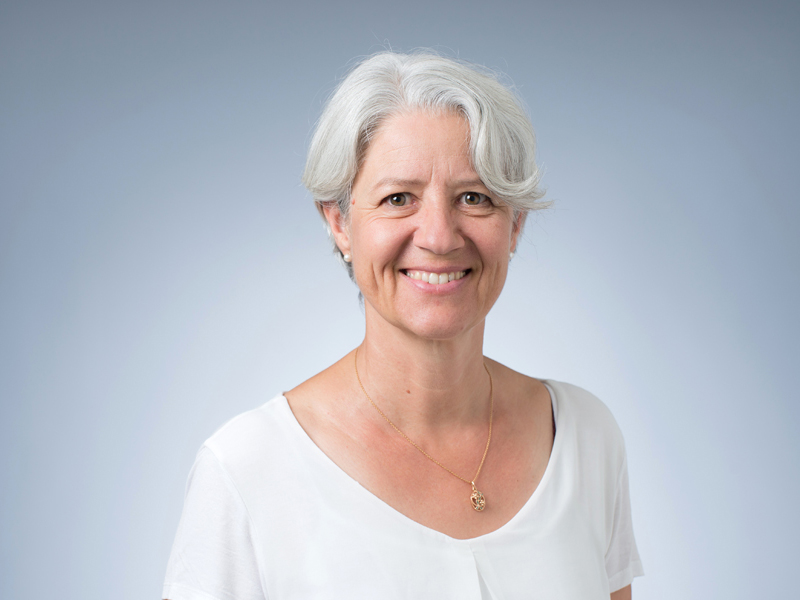Biography
Margot Thome-Miazza studied Biochemistry at the University of Tübingen and the University of Arizona, and completed her doctoral studies in the laboratory of Oreste Acuto at the Pasteur Institute in Paris. As a postdoctoral fellow she worked with Jürg Tschopp at the University of Lausanne. There, she explored apoptosis mechanisms and discovered human and viral FLIP proteins as key apoptosis regulators. In 2004 she became Assistant Professor of the Swiss National Science Foundation at the Department of Immunobiology (formerly Biochemistry), at the University of Lausanne. She was appointed Associate Professor in 2009 and Full Professor in 2017, and served as the Department’s deputy director from 2015 to 2024. She was appointed vice-dean of research and innovation of the faculty of biology and medicine of the University of Lausanne in August 2024. The molecular mechanisms of lymphocyte activation and lymphomagenesis are the main focus of her current research activity.
Research Interests
Research in the Thome laboratory focuses on the study of signaling pathways that control activation and survival of lymphocytes and the development of lymphomas.
Lymphocytes play a crucial role in the defense against pathogens and tumor cells. One focus of our research is to understand the molecular mechanisms that control the activation of T-lymphocytes, initiated upon triggering of the T-cell antigen receptor by MHC-bound antigen. This leads to the initiation of multiple signaling pathways that regulate changes in cell shape and gene expression that are critical for efficient T-cell activation, proliferation and survival. Another focus of our research is to understand the molecular mechanisms underlying aberrant lymphocyte proliferation and survival that occurs in certain lymphoid tumors (lymphomas) as a consequence of mutational activation of the antigen receptor signaling pathway. By uncovering new molecular players and enzymatic activities relevant to these pathways, we aim at identifying possible targets for therapeutic immuno-modulation or treatment of lymphomas.
Representative Publications
Jaworski, M., Marsland, B.J., Gehrig, J., Held, W., Favre, S., Luther, S.A., Perroud, M., Golshayan, D., Gaide, O. and Thome, M. Malt1 protease inactivation efficiently dampens immune responses but causes spontaneous autoimmunity. EMBO J. 33, 2765-2781 (2014).
Juilland, M., Gonzalez, M., Erdmann, T., Banz, Y., Jevnikar, Z., Hailfinger, S., Tzankov, A., Grau, M., Lenz, G., Novak, U. and Thome, M. CARMA1- and MyD88-dependent activation of Jun/ATF-type AP-1 complexes is a hallmark of ABC diffuse large B-cell lymphomas. Blood. 127, 1780-1789 (2016).
Bonsignore, L., Passelli, K., Pelzer, C., Perroud, M., Konrad, A., Thurau, M., Stürzl, M., Dai, L., Trillo-Trinoco, J., Del Valle, L., Qin, Z. and Thome, M. A role for MALT1 activity in Kaposi’s sarcoma-associated herpesvirus latency and growth of primary effusion lymphoma. Leukemia. 31, 614-624 (2017).
Schairer, R., Hall, G., Zhang, M., Cowan, R., Baravalle, R., Muskett, F.W., Coombs, P.J., Mpamhanga, C., Hale, L.R., Saxty, B., Iwaszkiewicz, J., Décaillet, C., Perroud, M., Carr, M.D., and Thome, M. Allosteric activation of MALT1 by its ubiquitin-binding Ig3 domain. Proc. Natl. Acad. Sci. USA 117, 3093-3102 (2020).
Juilland, M., Alouche, N., Ubezzi, I., Gonzalez, M., Rashid, H., Scarpellino, L., Erdmann, T., Grau, M., Lenz, G., Luther, S.A. and Thome, M. Identification of Tensin-3 as a MALT1 substrate that controls B-cell adhesion and lymphoma dissemination. Proc. Natl. Acad. Sci. USA 120 (52):e2301155120 (2023).
Chmiest, D., Podavini, S., Ioannidou, K., Vallois, D., Décaillet, C., Gonzalez, M., Quadroni, M., Blackney, K., Schairer, R., de Leval, L.L., Thome, M. PD1 inhibits PKCθ-dependent phosphorylation of cytoskeleton-related proteins and immune synapse formation. Blood Adv. 8(11):2908-2923 (2024).

